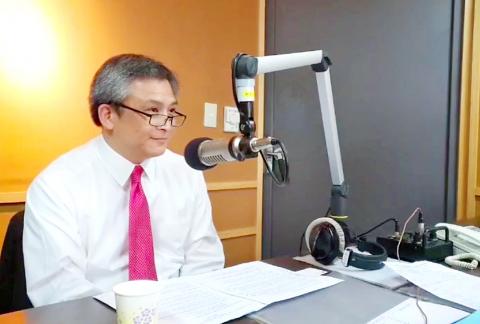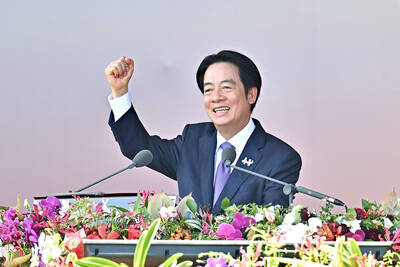The American Institute in Taiwan’s new compound in Taipei’s Neihu District (內湖), which will bring all of its divisions under one roof for the first time since the institute was established in 1979, is expected to become operational in September, AIT Director Kin Moy said yesterday.
During an interview with International Community Radio Taipei (ICRT), Moy reiterated that although the dedication ceremony for the complex is scheduled for Tuesday next week, the actual move would take place later.
“We are looking at, I am projecting here a little bit, the beginning of September when we will actually move,” Moy said, adding that it was likely to fall right around the US’ Labor Day, the first Monday in September.

Photo: screen grab from ICRT’s video stream
The AIT’s central role is helping and protecting the interests of US citizens in Taiwan, which sees about 79,000 US citizens visiting or living here on any given day, through services including issuing passports and helping US voters register, Moy said.
It also offers assistance to Taiwanese who are interested in studying in the US, Moy said.
The AIT handles 10,000 passport applications by US citizens, 34,000 non-immigrant visas, and 2,000 immigrant and student visas annually.
The AIT’s new compound is a five-floor building that has a “distinctive” design and is much bigger than its current premises, which is one of the reasons why it decided to move in the first place, Moy said.
When he gave President Tsai Ing-wen (蔡英文) a preview tour a few weeks ago, one of her comments was that “it [the architecture] is very American,” Moy said.
“[I guess] it just gives you that American feel, a kind of relaxed feel, or feelings where people are welcomed, people are humorous and people are just having a good time,” Moy said jokingly.
Meanwhile, AIT spokeswoman Sonia Urbom dismissed a Reuters article that cited anonymous US officials as saying that the institute would also commemorate the compound’s unveiling in September.
Reuters said that as the dedication ceremony coincides with a summit in Singapore between US President Donald Trump and North Korean leader Kim Jong-un, it was unlikely that Washington would send top officials to the Taipei event.
The ceremony is to be the first major public event related to Taiwan-US relations since the March 16 enactment of the US’ Taiwan Travel Act, which encourages high-level visits by US and Taiwanese officials.
“There are no plans to commemorate AIT’s new office complex aside from the dedication ceremony on June 12,” Urbom said.
When asked for comments on the AIT’s new facility, a US Department of State spokesperson on Monday said in an e-mail that the compound reflects the “enduring friendship” between Washington and Taipei.
“The new AIT office complex is a demonstration of the United States’ strong commitment to and enduring friendship with Taiwan,” the spokesperson said. “Through AIT, the United States and Taiwan share values and enjoy close cooperation on a wide range of regional and global issues.”
No list of US guests to attend the ceremony has been drawn up yet as preparations are ongoing, the spokesperson said.
Additional reporting by CNA

The Ministry of the Interior (MOI) is to tighten rules for candidates running for public office, requiring them to declare that they do not hold a Chinese household registration or passport, and that they possess no other foreign citizenship. The requirement was set out in a draft amendment to the Enforcement Rules of the Public Officials Election and Recall Act (公職人員選舉罷免法 ) released by the ministry on Thursday. Under the proposal, candidates would need to make the declaration when submitting their registration forms, which would be published in the official election bulletin. The move follows the removal of several elected officials who were

FOUR DESIGNATED AREAS: Notices were issued for live-fire exercises in waters south and northwest of Penghu, northeast of Keelung and west of Kaohsiung, they said The military is planning three major annual exercises across the army, navy and air force this month, with the navy’s “Hai Chiang” (海強, “Sea Strong”) drills running from today through Thursday, the Ministry of National Defense said yesterday. The Hai Chiang exercise, which is to take place in waters surrounding Taiwan, would feature P-3C Orion maritime patrol aircraft and S-70C anti-submarine helicopters, the ministry said, adding that the drills aim to bolster the nation’s offshore defensive capabilities. China has intensified military and psychological pressure against Taiwan, repeatedly sending warplanes and vessels into areas near the nation’s air defense identification zone and across

SENATE RECOMMENDATION: The National Defense Authorization Act encourages the US secretary of defense to invite Taiwan’s navy to participate in the exercises in Hawaii The US Senate on Thursday last week passed the National Defense Authorization Act (NDAA) for Fiscal Year 2026, which strongly encourages the US secretary of defense to invite Taiwan’s naval forces to participate in the Rim of the Pacific (RIMPAC) exercise, as well as allocating military aid of US$1 billion for Taiwan. The bill, which authorizes appropriations for the military activities of the US Department of Defense, military construction and other purposes, passed with 77 votes in support and 20 against. While the NDAA authorizes about US$925 billion of defense spending, the Central News Agency yesterday reported that an aide of US

NATIONAL DAY: The ‘Taiwan Dome’ would form the centerpiece of new efforts to bolster air defense and be modeled after Israel’s ‘Iron Dome,’ sources said President William Lai (賴清德) yesterday pledged to strengthen the nation’s air defense capabilities and build a “T-Dome” system to create a safety net against growing military threats from China. “We will accelerate our building of the T-Dome, establish a rigorous air defense system in Taiwan with multi-layered defense, high-level detection and effective interception, and weave a safety net for Taiwan to protect the lives and property of citizens,” he said in his National Day address. In his keynote address marking the Republic of China’s (ROC) 114th anniversary, Lai said the lessons of World War II have taught nations worldwide “to ensure that